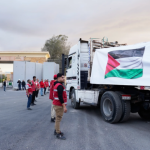
Israel’s terrible phosphorous bomb attack on Lebanon
Lebanon’s state news agency, the National News Agency (NNA), reported that Israel launched phosphorus bombs targeting forested areas in southern Lebanon. As a result, there was a fire. The attack was carried out near the city of Kafar Qila, NNA said. Al-Jazeera news
Human Rights Watch researcher Ramji Kais said in a recent report that Israel’s use of airburst white phosphorus munitions in populated areas is indiscriminately harming civilians and forcing many to flee their homes.
Meanwhile, a video verified by Al-Jazeera’s Sanad fact-checking agency showed that a Hezbollah drone attack targeting an Israeli military base in Ayelet Hashahar in the Upper Galilee caused panic among the troops.
Footage shared by Israeli army radio shows sirens blaring around the Israeli base, with soldiers running in fear.
How much damage does white phosphorus do?
Humans experience severe burns when exposed to white phosphorus, in many cases it burns to the bones and takes a long time to heal. There is also a risk of infection.
Even if only 10 percent of the human body is burned due to white phosphorus, it is still fatal. Exposure to it can cause breathing difficulties in humans and can cause many body organs to stop working.
Survivors suffer for the rest of their lives from the initial injuries caused by white phosphorus.
White phosphorus fires can also damage homes and buildings, destroy crops and cause livestock deaths.
Legal and Ethical Concerns with White Phosphorus
The use of white phosphorus in armed conflict is prohibited in several international legal frameworks.
Protocol 3 of the Convention on Convention Weapons (CCW) prohibits the use of white phosphorus as a firearm against civilian populations or civilian areas.
Under the Protocol, it should only be used for signaling, screening and marking in accordance with the principles of international humanitarian law.
The use of white phosphorus in armed conflict has sparked considerable controversy, with some calling for stricter regulations and more monitoring to minimize damage to civilians and the environment.






![Pakistan accuses the TTP of carrying out attacks on its territory and the Afghan Taliban government of harbouring the group [File: Fayaz Aziz/Reuters]](https://asiandiplomacy.com/wp-content/uploads/2025/10/2023-02-27T041341Z_1777986366_RC2O7Z9GI1FB_RTRMADP_3_PAKISTAN-BLAST-POLICE-1760256429-150x150.webp)